It was certainly not our most pressing issue. But since Premier-elect François Legault decided to bring the issue of laity front and centre on his first day, and since that issue has caused so much debate and discord the past week - including thousands of Montrealers demonstrating this past Sunday - we thought it was important to bring some perspective, and a warning, on this issue.
It is quite reasonable in the western liberal tradition to put up a firewall between faith and state. From American President James Madison stating, “The civil administration shall take no cognizance of religion” at the beginning of the 19th century, to the French “modele Republicain” inspired by Jean Jaurés at the end of that century, freedom of religion has been accepted to mean freedom from religion as well. Indeed, freedom from accommodating every particularity, because if we incorporate full legal accommodation of the some 130 cultures and faiths that Canada recognizes we couldn’t run the country. It has also been a foundational principle of western liberalism that religion shall not influence - nor be seen to influence - the making and enforcement of laws and legislation that must be universal in their scope and application.
Thomas D’Arcy McGee, a Father of Confederation, said in 1863 that, “There is room in this Northern Dominion - under one flag and one set of laws - for one great people. There is no possibility for greatness - under that same flag and those same laws - if we succumb to a hundred squabbling particularities.”
 It is therefore within the bounds of acceptability to put forward the proposition that in the legislature where our laws are made; in our courts where justice is meted out; in our security services where authority exercises its rule and in public schools where young minds are formed - in all the public areas where the intellectual character of a society is forged - that these areas of endeavour should be free of religious symbolism. Not just because of a dogmatic devotion to secularism, but to put all faith communities on an equitable basis in the public - and publicly funded - square and that as a society we do not “succumb to squabbling particularities.” Religion should be what it was always envisioned to be in western democracies. A private matter without interference from - nor submission to for political purposes by - the state.
It is therefore within the bounds of acceptability to put forward the proposition that in the legislature where our laws are made; in our courts where justice is meted out; in our security services where authority exercises its rule and in public schools where young minds are formed - in all the public areas where the intellectual character of a society is forged - that these areas of endeavour should be free of religious symbolism. Not just because of a dogmatic devotion to secularism, but to put all faith communities on an equitable basis in the public - and publicly funded - square and that as a society we do not “succumb to squabbling particularities.” Religion should be what it was always envisioned to be in western democracies. A private matter without interference from - nor submission to for political purposes by - the state.
The CAQ proposal is limited to the areas set out above. The outgoing Liberal government also considered a similar proposal. To those of you who would compare this initiative to the PQ’s Bill 60 - the so called Charter of Values - let us point out a distinct and vital difference. The PQ legislation sought to ban religious symbols in the entire public service including health care. That flew in the face of reason, There could be no possible prejudice to society if medical professionals - or any social service employee - wears religious symbols. Hospitals are places where people should be made well. There are no laws or philosophies being propogated there. There is no intellectual character being formed.
However, Mr. Legault and the CAQ must come to terms with one great issue if their proposal is to be intellectually honest and not viewed as political pandering to a specific political base. They must not allow for what has been called the “Christian cultural exemption.” This arose when Premier Marois and several of her Ministers made the argument that the cross in the legislative chamber of the National Assembly was exempt because it related to Quebec culture and history. Well, it certainly does not.
The PQ missed an opportunity to educate Quebecers. And indeed every important voice in French media ridiculed the PQ’s position on this issue and pointed this out. The cross on Mount Royal has historic significance. It is a commemoration of the crosses put up by Cartier and de Maisonneuve. It denotes no societal or governmental obedience to the Church. And nothing is legislated on that mountain top. The cross in the Assembly however, is a direct result of a political deal with the Church made by Premier Maurice Duplessis in 1936 to manifest an indefensible intimacy between Church and State that plagued Quebec for a generation. The PQ chose to disregard that. If a cross can be “cultural” so can every other religious symbol.
Last week, newly elected CAQ MNA Simon Jolin-Barrette stated to the media that “Since the Quiet Revolution Quebecers have chosen a separation between religion and the state.” He is quite right. Therefore it is to be hoped that since M. Legault made laity the first issue on the first day after his election, he will make removal of the Assembly Cross his first act after his official assumption of office. Only that act - and that act alone - can be the needed eloquent affirmation of legitimacy to the values he and his party have espoused and now propose to put into law.

























Commentaires
Veuillez vous connecter pour poster des commentaires.